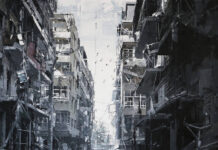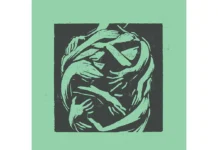We of Musicalypse have known and appreciated SABATON for many years now, but during the chaos of summer 2019, we nearly forgot about their newest album, “The Great War,” which is released today. Taking a step in a new direction, “The Great War” has been released with a regular edition as well as a “historical edition,” which has extended recordings of the tracks that help explain the songs’ backgrounds.

The album begins with “The Future of Warfare,” a somewhat standard Sabaton song about tanks and their impact on the war. It’s certainly no “Ghost Division,” but it has grown on us with each listen. T.E. Lawrence was the inspiration for “Seven Pillars of Wisdom,” which has a pretty badass chorus that’s easy to sing along to and will definitely make for a good live track.
If you want to hear a song that sounds like SABATON singing the words to a history textbook, “82nd All the Way” has that feeling. This song is shamelessly upbeat and hits disco levels a few times. For us, that’s pretty fun, though it’s definitely far from the heaviest song on the album if you want your SABATON a little less radio friendly. “The Attack of the Dead Men” references the use of chlorine gas in trench warfare; it’s an epic and terrifying concept but the song is a bit sluggish and doesn’t quite invoke how terrifying it must have been to see men – who were dying of chlorine poisoning – coming out of the fog to kill you.
If you want some straightforward SABATON, “Devil Dogs” is a song about the fifth American marine regiment, and is basically a handful of SABATON songs – existing riffs, melodies, and progressions that have been in their other songs – repurposed for the sake of this song. It’s the least imaginative of their songs, as it just sounds like SABATON ripping off SABATON… it sounds good, but it’s far too familiar. “Red Baron” – a name that you might already know – is the type of song you might get hyped on, but then grow quickly sick of it. While it does have some DEEP PURLE organs and a nice solo, it lost our attention in the chorus. A good hype-up song for sure, but too repetitive.
“Great War” has had a bar set for it already, as IRON MAIDEN released a song called “Paschendale” about the same battle that was perhaps the best song from “Dance of Death” (2003). The traditional chorus-followed-by-keyboards can be heard in here, along with some of Joakim Brodén‘s deepest vocals and a heavily burdened marching beat; while it’s not as epic as MAIDEN‘s 8-minute tribute, they do an admirable job with this song and you’ll definitely be able to pump your fist to it at a live show.
The sniper Francis Pegahmagabow is the “Ghost in the Trenches,” but the song is one of the less-memorable on the album. However, its follow-up, “Fields of Verdun” is an easy favorite, with it’s great energy, catchy and fun to sing chorus rhymes, and straightforward heavy metal feel. SABATON aren’t exactly known for perfect English, so the cleverness of the chorus was a nice touch, as is the neoclassical guitar solo.
The album begins its wind-down with “The End of the War to End All Wars,” which is also the closest you might see a band get to prog in under 5 minutes. Starting slow but with a surprise dynamic punch and some almost oriental sounds (think IRON MAIDEN‘s “Powerslave”) before returning to classic SABATON. There are some ALESTORM-y chants, the epic group choir, and while the song is short and the solo isn’t the best from the album, it manages to be a surprisingly unique and powerful song for SABATON.
The album closes officially with the Canadian poem, “In Flanders Fields,” by John McCrae as sung in church choir -style. It’s a pretty and fitting end to the album, if perhaps a bit out of place contrasted with the rest of the heavy metal music.
This is perhaps the most “SABATON” album we’ve heard in a long while. You make take that to be good or bad based on your opinion of SABATON, but to us, it meant that we were hearing everything that makes SABATON who they are – a concept album about war, singing the years and the number of casualties along to catchy, upbeat music, and the songs are ready and waiting to be rocked out to live.
If the album was missing something in its concept, it was a narrative through-line. “The Great War,” in some ways, feels a bit like a normal SABATON album with a new skin. The concept really didn’t do anything different than albums like “Heroes” (2014). They were still one-off songs about things that happened during the war, but there is nothing to connect the songs beyond their WWI theme. It’s nice that they’re putting in an effort to be more historical again (they lost this a bit in the aforementioned “Heroes”), though having a narrative thread that goes throughout the album and tells a story would have, we thought, been more powerful (especially since we thought the historical parts could’ve been a bit more in depth).
So if you’re looking for something new and fresh… well, you’re looking at the wrong band. But that in mind, if you’re one of those people who gets annoyed when a band changes their sound, perhaps SABATON is nice and consistent; alternatively you might find the band predictable and repetitive. We applaud the performances on the whole, particularly the drums, and a few of these songs will definitely end up on some of our party playlists!
Written by Bear Wiseman & Simo Kuusterä
Musicalypse, 2019
OV: 1362
Tracklist
- The Future of Warfare
- Seven Pillars of Wisdom
- 82nd All the Way
- The Attack of the Dead Men
- Devil Dogs
- The Red Baron
- Great War
- A Ghost in the Trenches
- Fields of Verdun
- The End of the War to End All Wars
Lineup
Joakim Brodén – vocals
Pär Sundström – bass
Chris Rörland – guitars
Tommy Johansson – guitars
Hannes van Dahl – drums
Label
Nuclear Blast Records
Links
Recent posts
[recent_post_carousel design=”design-1″]





